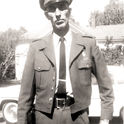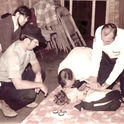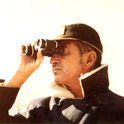Then and Now
George Gillian
Linda Hill Mann
George Alfred ‘Al’ Gillian (1927–2004) was born in Sandstone, West Virginia. He was the son of George Milroy and Catherine ‘Kate’ O’Conner Gillian. In 1948, he married Patsy ‘Patty’ Anne Williams Williams (1933–2025), the daughter of Green L. and Esther R. Williams. Together, they had three children: John, Kathy, and Becky.
George was a veteran. At the beginning of World War II, like many young men of his time, he lied about his age to join the Navy. He completed basic training before the Navy discovered his true age and sent him home to grow up a little longer. He later served in the Army. After his discharge in 1945, he became a seaman in the Merchant Marines, serving aboard the USS Whitney, which delivered food to Poland, where people were starving in the aftermath of the war. Before re-entering military service—this time in the Army during the Korean War—he played guitar in a band on a live radio show. Throughout his military career, he served as a Military Policeman.
George held various jobs over the years. He drove a truck and worked for the C&O Railway before moving his family from Hinton to Athens in 1962 to become one of the town’s two policemen. When the police chief left, George stepped into the role and became Chief of Police for Athens in 1968. In 1971 or 1972, he became the first Security Police Chief of Concord College, now Concord University.
Later, George worked as a paramedic before once again serving as Athens’ police chief around 1982. At the same time, he also led the Athens Volunteer Fire Department. He played a key role in securing a closed service station for use by the Fire Department—a building still in use in 2025. During his time as Fire Chief, he and a group of men converted an old truck into the department’s first tanker truck, which proved especially useful in areas without fire hydrants.
George enjoyed being both a policeman and a paramedic. His son John worked alongside him as a paramedic for about four years, a time both remembered fondly.
John described his father as very laid-back and always willing to help others. Although on call 24/7, when not actively working, George enjoyed relaxing and watching TV. He also loved working in the yard.
John recalled that his father was straightforward and reasonable, even with wrongdoers. He didn’t speak harshly and always treated people with respect. George would never stand by if he saw someone being mistreated. One piece of advice that stuck with John was his father’s instruction to “always be upfront with people.”
As a boy, John occasionally rode along on patrols with his father, which he found thrilling. He said his parents instilled in him honesty, a strong work ethic, and a desire to help others—values he still lives by. George was the disciplinarian in the family. He expected obedience and respect but was never rough or abusive. The only downside to having a policeman for a father, John said, was that some of his friends were afraid he might tattle on them.
George believed in helping more than punishing. He often took young offenders home to their parents instead of arresting them. Tall and skinny at 6’2”, George weighed only 119 pounds when he registered for the draft—but that didn’t stop him from handling serious offenders or transporting them to the jail in Princeton when necessary.
Once, while on patrol, George saw a young man acting up and asked if he was drunk. The young man replied, “Yes, I am,” and started to get into the back of the patrol car. George stopped him, saying, “Oh no, you’re not getting sick in my car.” Instead, he had the young man walk alongside the patrol car, holding onto his arm as George drove through town at five miles an hour. It must have been quite a sight for the citizens of Athens.
A young local lad just beginning to drive learned the hard way about George’s philosophy of taking people home instead of harsher penalties. Henry Friedl was showing off his brother’s car, revving the loud mufflers to enjoy the sound bouncing off the buildings on Vermillion Street. George saw and heard him, of course, and escorted him home—with the “blue top light” flashing. Henry sat sheepishly in the ’55 Buick Special while George had a word with dad Friedl. Henry didn’t get a ticket, but he learned his lesson. Later, George told him he had sounded like an airplane flying past Doc Gatherum’s house. He never made that mistake again.
George had been using his personal car while on patrol, until the town finally decided it was time to provide an official police vehicle for the chief. Two local boys, Garland Elmore and David Baxter, were chatting with George about the upcoming upgrade. With gleams in their eyes, they imagined a souped-up, eight-cylinder muscle car—the kind of powerful machine they thought their police chief deserved.
However, the town, strapped for cash, purchased a used black-and-white six-cylinder, automatic transmission Chevy Biscayne instead—not exactly the muscle car the boys had in mind. It was a big letdown for Garland and David, but George, true to his easy-going nature, took it all in stride.
A few days later, the boys were hanging out in front of the Athens movie theater when George drove by in the new police car. As described earlier, George was tall and lean, with long, skinny legs. As he passed, he began pumping his legs up and down as if he were riding a tricycle or toy car. All that Garland and David could see through the car window were Chief Gillian's knees rising and falling—up and down, up and down. Known for his sense of humor, George kept a straight face as he rolled past, legs still churning. Naturally, the boys burst into laughter and never forgot his sense of humor.
George likely wouldn’t be happy with the way police work has changed in recent years. The shifts in public attitudes, the rise of new technology, and the challenges of today’s drug epidemic would all seem foreign to his way of thinking. He represented a different era of small-town policing—one rooted in respect, responsibility, and a deep sense of community service. He is badly missed.
Postscript: John Gillian, son of George and Patsy Gillian, contributed content for this essay and provided photographs include in the Dedicated to Service album.

George "Al" Gillian shown here in the late 1960s during his years in Athens as Chief of Police.
Devoted to Service
























